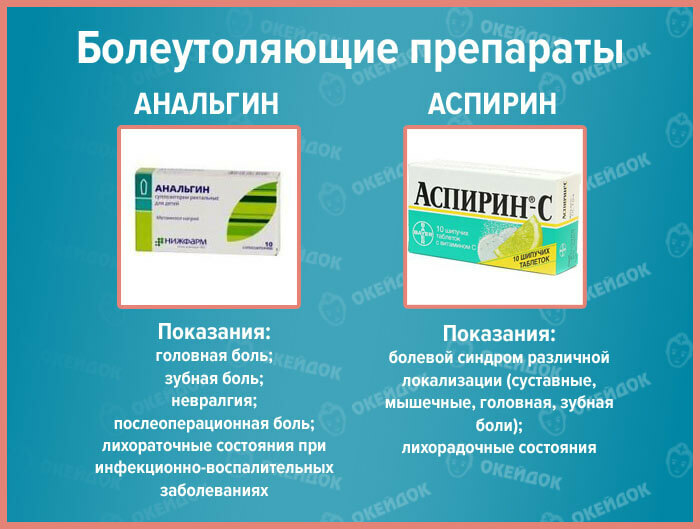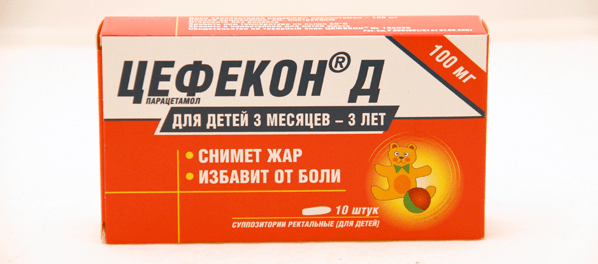Ginseng: useful properties and contraindications, use in medicine
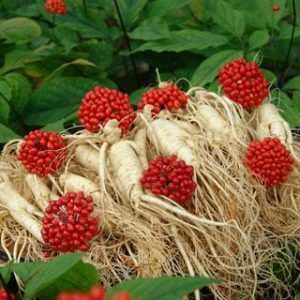
It can be found in a large number of medicines, as well as popular lines of cosmetics for skin care of the face and body.
Table of contents: General definition Chemical composition Useful properties of ginseng and recommendations for use Medicinal preparations based on ginseng root Harm to ginsengGeneral definition
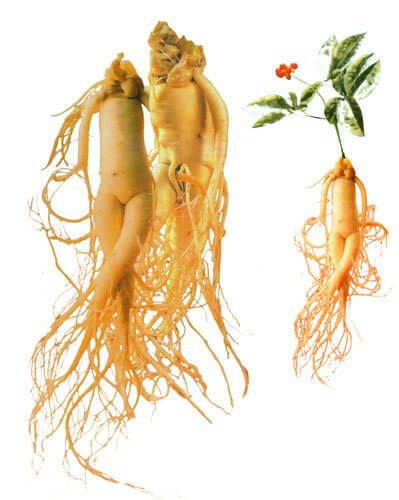 Ginseng is a perennial herbaceous plant belonging to the Araliev family.The distribution area is East Asia( China, Altai, Tibet, Vietnam), North America.It is also grown in the conditions of the Russian Federation, and greenhouses or specially-allocated plantings with the weather conditions suitable for its comfortable existence .In order to grow, reproduce and preserve useful properties, this plant needs a loose, rich in nutrients, moistened soil.It does not grow in places where there is direct sunlight, preferring a moderate shade of broad-leaved or coniferous forest.
Ginseng is a perennial herbaceous plant belonging to the Araliev family.The distribution area is East Asia( China, Altai, Tibet, Vietnam), North America.It is also grown in the conditions of the Russian Federation, and greenhouses or specially-allocated plantings with the weather conditions suitable for its comfortable existence .In order to grow, reproduce and preserve useful properties, this plant needs a loose, rich in nutrients, moistened soil.It does not grow in places where there is direct sunlight, preferring a moderate shade of broad-leaved or coniferous forest.
Ginseng grows no more than half a meter in height, the stems are single, with elongated leaves.The plant lives very long, the average life span of ginseng is about 100 years.
Since ancient times, medicine and cosmetology are used various preparations made from the yellowish root of a medicinal plant having an unusual shape.The root is similar to a little man, with handles and legs, for which he received his name from the Chinese "gin-seng" - the root man.
Later, from the eastern medicine, the useful root successfully passed into the prescriptions of Western and European doctors.
Chemical composition
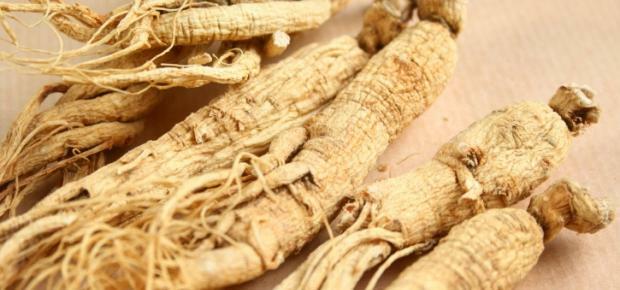
The root of this herb contains a large number of certain plant glycosides - saponins and xatriols, as well as essential oils, mucus, resins, pectin components.In addition, the ginseng root is a source of vitamins B and C.
Ginseng is not only rich in a lot of useful organic components, but it is also one of the most micronutrient-rich medicinal plants. As part of its root during studies were detected :
- copper,
- zinc,
- iron,
- sulfur,
- selenium,
- magnesium,
- manganese,
- silicon,
- molybdenum,
- of strontium and barium.
All these chemical components are basically contained in high enough doses and have pronounced effects.
Useful properties and recommendations for use
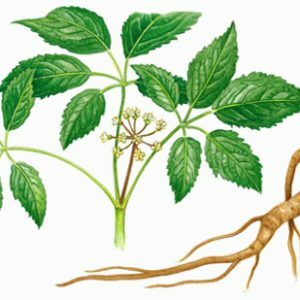 Ginseng has a stimulating, invigorating, toning effect.Medicinal preparations from this useful plant are prescribed primarily for depression, apathy, lethargy, drowsiness, permanent general weakness.In Chinese medicine, he was recommended in the absence of a will to live.
Ginseng has a stimulating, invigorating, toning effect.Medicinal preparations from this useful plant are prescribed primarily for depression, apathy, lethargy, drowsiness, permanent general weakness.In Chinese medicine, he was recommended in the absence of a will to live.
Its use is widespread in reversible psychosomatic disorders.Ginseng is also an excellent stimulator of blood circulation in hypotension, with diabetes it can lead to normalization of blood sugar level and restoration of normal metabolism.
In addition, the extract of ginseng root has a strengthening effect on blood vessels, muscles, tissues, stabilizes the work of the cardiovascular system and strengthens the immune system, normalizes the humoral regulation of the body.Due to its properties, it is used in adults as a prophylactic for catarrhal diseases, both viral and bacterial.
The root has a pronounced regenerating properties.It is able to favorably influence the cells and tissues of damaged organs, causing them to divide in accelerated mode and recover more quickly.This applies not only to superficial wounds on the skin, but also to various injuries of the internal organs, for example, the liver.Ginseng has a very beneficial effect on hepatocytes, stimulating the affected organ for accelerated regeneration.
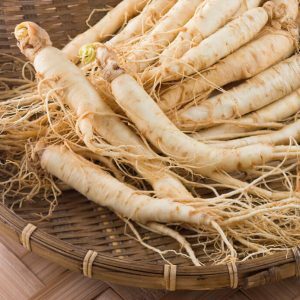 The ginseng root has long been known as one of the most powerful aphrodisiacs.Substances contained in the root of ginseng "stimulate the potency, prolong sexual intercourse, significantly increase the hardness of the erection and increase the mobility of spermatozoa.
The ginseng root has long been known as one of the most powerful aphrodisiacs.Substances contained in the root of ginseng "stimulate the potency, prolong sexual intercourse, significantly increase the hardness of the erection and increase the mobility of spermatozoa.
Applying tincture, root or tea with this healing plant will help you to adapt quickly in an unusual situation, in adverse weather conditions or strong daily stress.The extract of the ginseng root causes the natural defenses of the body to work in an accelerated mode, increasing endurance to physical fatigue, psychological stress, unfavorable factors of the internal and external environment.
Specialists in the field of pharmacology refer ginseng to general-toning agents .
Drugs based on ginseng root
In order for the patient to choose the most convenient and rational for each clinical case, there are several forms of release of drugs based on ginseng:
-
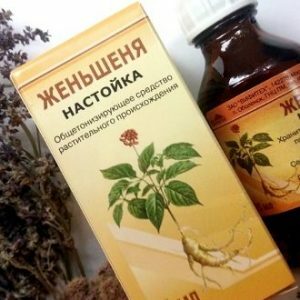 Tablets that are driedAnd compressed extract of ginseng root.In some cases, for the best preservation of forms and useful properties, the dry plant extract is mixed with neutral fillers. To take any oral form of drugs with ginseng is only needed in the morning, otherwise the risk of insomnia is greatly increased.
Tablets that are driedAnd compressed extract of ginseng root.In some cases, for the best preservation of forms and useful properties, the dry plant extract is mixed with neutral fillers. To take any oral form of drugs with ginseng is only needed in the morning, otherwise the risk of insomnia is greatly increased. - Capsules and granules coated with enteric coating.The form of release of the prolonged action, the effect is expressed much longer and more strongly, than at use of tablets.It is recommended to use with intensive recovery of the body, for active stimulation of brain activity and for easier passage of the acclimatization period.
- Alcohol tincture.The drug is diluted in water before use.For an adult, 15 drops are used once a day.Any drugs taken orally are effective only if you drink them on a course that is at least 40 days.
- Ginseng oil.It is most often used for external medicinal and cosmetic forms: creams, ointments, lotions, tunics and gels.In some cases, it is added to shampoos, to stimulate hair growth and accelerate their regeneration, for example, when the staining or chemical perm is unsuccessful.Adding ginseng oil to the bathroom leads to an increase in skin tone and rejuvenation of the upper layer of the epidermis.
Important! Before using any medicine or dietary supplement containing high doses of ginseng extract, it is necessary to consult a specialist physician.
Harm to ginseng
Like any other medicinal substance, the ginseng root has a number of contraindications in which its use can cause irreparable harm to the body:
- it can not be used by children under 18 years old, as they can develop hyperactivity;
- during pregnancy and feeding, the use of ginseng is strictly prohibited;
- uncontrolled drug intake, as well as heavily inflated doses can trigger an allergic reaction;
- The most common side effect of the extract of this plant is hyperexcitability and insomnia;
- for pathologies of the cardiovascular system, ginseng can trigger a pathological increase in blood pressure and tachycardia;
- in some cases there is increased muscular tone, spasms and convulsions.
In order to prevent the risk of side effects, it is necessary to consult a doctor before using the drug and perform the necessary tests for sensitivity to medicines based on ginseng.
Konev Alexander, internist


